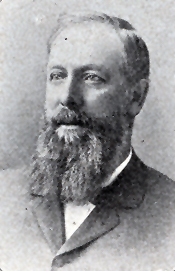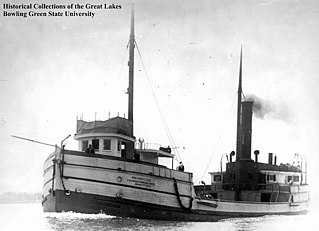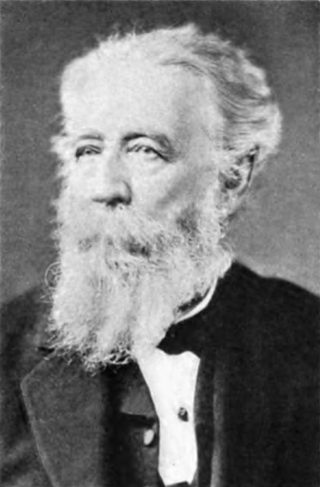Related Research Articles

William Edward Boeing was an American aviation pioneer. He founded the Pacific Airplane Company in 1916, which was renamed to Boeing a year later. The company is now the largest exporter in the United States by dollar value and among the largest aerospace manufacturers in the world.

Menards is an American home improvement retail company headquartered in Eau Claire, Wisconsin. Menards is owned by founder John Menard Jr. through his privately held company, Menard, Inc. It has 351 stores in 15 states: Illinois, Indiana, Iowa, Kansas, Kentucky, Michigan, Minnesota, Missouri, Nebraska, North Dakota, Ohio, South Dakota, West Virginia, Wisconsin and Wyoming, with plans to expand to Pennsylvania. Menards is the third-largest home improvement store in the United States, behind Lowe's and The Home Depot.

Harrison Ludington was an American businessman, Republican politician, and Wisconsin pioneer. He served as the 13th governor of Wisconsin and was the 20th and 22nd mayor of Milwaukee, Wisconsin.

Rousseau Owen Crump was a politician and businessman from the U.S. state of Michigan.

Abner Kirby, Jr., was an American businessman, politician, and Wisconsin pioneer. He was the 16th mayor of Milwaukee, Wisconsin, and played an important role in the early growth and economic development of southeast Wisconsin.

William John Young was the founder of the W.J. Young Company. He revolutionized the slow system of rafting logs by floatage with the current of the river in 1865 by a successful experiment of pushing log rafts ahead of a steam boat, independent of the river currents, and this with his introduction of the system of brail rafting, facilitated the movement of log stock while greatly lessening the expense of delivering them from the booms at Reef Slough and other points, to the mills at various points on the lower river; but for these advantages, the work of the mills would never have reached the vast volume to which they soon attained. Mr. Young was one of the original members of the Mississippi River Logging Company, his interest in which he sold in 1893, after being for many years one of the most active and influential members of the company.
James Playfair was noted for his entrepreneurship in the Great Lakes shipping, lumbering, grain handling, and industrial manufacturing businesses. He was a central figure in the establishment of Midland, Ontario, Canada. The son of John Speirs Playfair and Georgina Hall of Montreal, in 1889 Playfair married Sarah Charlotte Ogilvie (1858-1945), youngest daughter of Senator A.W. Ogilvie of Montreal, former president of Ogilvie Flour Mills.

Three Brothers was a small wooden Great Lakes lumber freighter built in 1888 by the Milwaukee Shipyard Company of Milwaukee, Wisconsin for the Chicago-based John Spry Lumber Company. Originally she was christened as the May Durr and bearing the official number 91998. The vessel was rated at 582 gross tons, 444 net tons, and measured 162 feet (49 m) in length, had a 31.4-foot (9.6 m) beam and a draught of 11.8 feet (3.6 m). She could carry 530,000 board feet (1,300 m3) of lumber.
Charles Hiram Burnett was an American politician and commission merchant who was the first Treasurer of the City of Seattle 1869-1872, and the General Superintendent of various coal mines in King and Pierce Counties on Puget Sound in the state of Washington.
Howard Potter was an American industrialist, investment banker, diplomat and philanthropist, and a partner in Brown Bros. & Co.
Jesse Henry Leavenworth was a military officer and engineer.
Charles Manegold Jr. was a founding father of the Milwaukee Parks Department. Manegold was president of the Milwaukee-Waukesha Brewing Company, with plant at No. 155 South Water Street in Milwaukee, was born September 15, 1851, in the city which is still his home. His father, Charles Manegold, was a native of Braunschweig, Germany, and came to the United States in 1848. For a time he resided in Cincinnati, Ohio, and then removed to Milwaukee. He was a blacksmith by trade but in later life turned his attention to the ice business in this city and in 1868 built a flour mill on South Water street, which he continued to own and operate until his death in May 1879, his son Charles Jr., being associated with him in this undertaking. He was an active and progressive businessman and he enjoyed the respect and confidence of all. His father was Henry Manegold, who was likewise a blacksmith by trade. The mother of Charles Manegold Jr. bore the maiden name of Wilhelmina Notbohm, and she too was born in Braunschweig, Germany, while her death occurred in Milwaukee in 1909. Our subject has two brothers, Henry and William, who are yet regents of Milwaukee, the former now living retired. Two other brothers, Fred and Albert Manegold are deceased.

Henry Howard was a banker and businessman, and served as mayor of Detroit in 1837, and as the first treasurer of the state of Michigan.

Charles Howard was mayor of Detroit in 1849.

Gallinipper was a schooner that sank in Lake Michigan off the coast of Centerville, Manitowoc County, Wisconsin, United States. In 2010, the shipwreck site was added to the National Register of Historic Places.

William Hayes Perry (1832–1906) was a 19th-century lumber merchant and financier in Los Angeles. He was known as "a masterful man whose influence and backing has been felt for fifty years in the development of Southern California."
Charles Merrill was an American entrepreneur who owned mercantile, construction, real estate, and lumber companies in Maine, Virginia, and Michigan.
Musser Lumber Company was a US lumber company, and one of Iowa's pioneer lumber concerns. In its day, it was one of the most complete and modern lumber mills on the Mississippi River, employing about 400 men during the working season, and between 200 and 300 men in the logging end of the business.

Nelson Ludington was a nineteenth-century American businessman, lumber baron and banker. Born in Ludingtonville, New York, he made his fortune in the Midwest based on resource exploitation: lumber, iron ore and copper.

John Mason Loomis was a nineteenth-century American businessman and lumber tycoon from Chicago who was known for developing the city of Ludington, Michigan. He was involved with the Pere Marquette Lumber Company, which also operated salt distilleries that in turn influenced the salt industry of northern Michigan. The village of Pere Marquette benefited from these local industries and developed into the city Ludington.
References
- ↑ "The Nation". 1887.
- ↑ New York Times 7/24/1963 Obituary of Burton J. Lee, Jr.